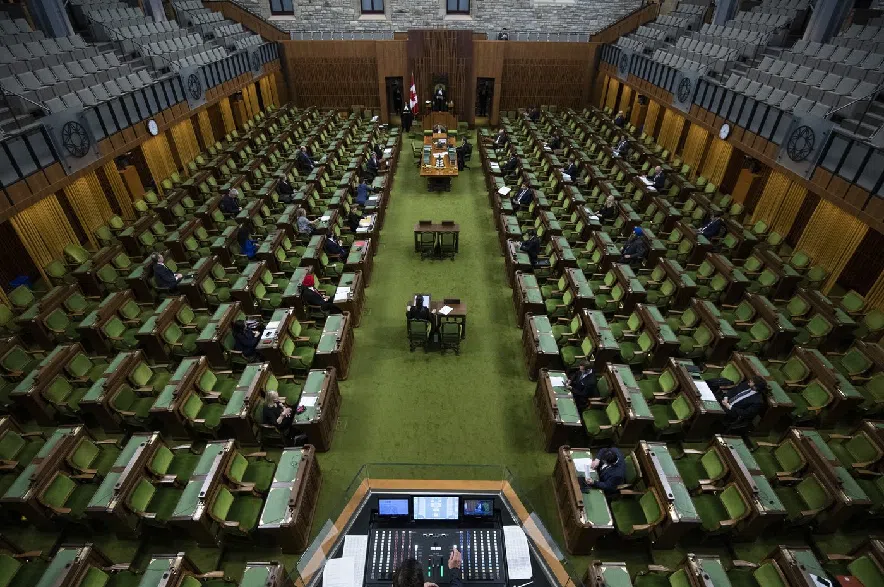Prime Minister Mark Carney this week signed a decision note signalling a Canadian middle class tax cut that the government says will help that will benefit 22 million Canadians and provide a family with two incomes up to $840 of benefits.
Vassy Kapelos spoke with John Broussard, Conservative MP for Barrie South-Innisfil in Ontario, about his party’s support for the middle-class tax cut move when it makes its way into parliament, which reconvenes on May 26.
The Vassy Kapelos Show airs on Saturdays and replays on Sundays on 650 CKOM and 980 CJME.
Read more:
- Almost half of Canadians say Carney ‘stood up’ for country in Trump meeting: poll
- In Canada’s housing crisis, are modular homes a cheaper and faster solution?
- Canada Post report puts union in tight spot as bargaining deadline looms, experts say
These questions and answers have been edited and condensed for clarity.
John Broussard: We have to see what’s in the ways and means motion proposing this tax cut. A ways and means motion can have poison pills in there that causes the Opposition to question the intent of the government.
We’d like to see an indication that the industrial carbon tax will be scrapped and the capital gains tax is still an issue for many people. I know the government has said that they’re not going to increase the capital gains tax but that’s something that I’d like to see in the motion.
Vassy Kapelos: Are there negotiations underway between your party and the Liberals to work and move forward on some of what you just laid out?
Broussard: There’s no question that affordability was the top issue coming out of this election. I’m not aware of any discussions between the Liberals and anyone else within our party as to whether we’re going to support the measures that they have indicated that they’re going to introduce into parliament, but affordability is the top issue. Housing affordability and housing attainability are issues that we can universally agree on.
If whatever is indicated in the ways and means motion is indicative of what Finance Minister François-Philippe Champagne said, I see no reason not to support it. There’s not going to be a budget until the fall and that’s a critical element to any discussions.
Kapelos: Would you like to see a budget before you can advance discussions on affordability?
Broussard: The prime minister said throughout the course of the election campaign, that a plan beats no plan. We want to see the plan.
In fall 2024 when they introduced the fall economic statement, it was a bit of a fiasco. The finance minister didn’t even present it, it was just tabled in Parliament and there was no debate.
By proroguing parliament, we weren’t able to see a budget. So we need to see a plan. For example, the prime minister indicated that there was going to be $200 billion in spending initiated by the government. Where is that spending going to go?
In the fall 2024 economic statement there were over $60 billion in deficits. We’ve seen the debt increase to $1.4 trillion and need to know what the government is going to do to bring that down, or if they’re going to increase it, how they’re going to increase it.
The government has the power to extend the session of parliament, and we would be willing to work right through the summer if we had to to pass a budget and make sure that Canadians are aware of government spending plans.
Kapelos: Champagne said there is a certain level of uncertainty right now that would make it more difficult to chart out as transparent a path as they have promised, and they feel by the fall, things might be some more predictive. During the election campaign your party did not include the economic impact or potential economic impact of the trade war. Does it not make some sense to wait?
Broussard: Based on what U.S. President Donald Trump has stated is we’re in a place right now where we’re understanding in real time what the impacts of those tariffs are having and so I believe the government has to be transparent with Canadians and say ‘this is how we’re going to spend our money.’
We know that there are threats to the auto sector and there are other threats that are happening. The government is aware of these threats, and so they should lay a plan out for Canadians on what exactly they’re going to do to mitigate the impact of these tariffs, and they can only do that through a budget.
Kapelos: Your party could not come up with concrete numbers to assess the impact of the trade war, so you didn’t include it in your election costing. You did bake in $20 billion of revenue from counter tariffs, the same thing the Liberals did. They didn’t, they weren’t able to include that assessment either. Is it not possible that that information is just not reliable enough?
Broussard: Budgets can be dynamic, there can be additional updates. If the government wanted to, they could provide an interim budget right now based on the impact and implications of any tariffs that have been levied, the impact on certain sectors of our economy and how they’re going to plan to deal with that.
I don’t see any excuse for not implementing a budget right now.
Kapelos: There were deficits in your plan as well. In principle, you don’t need to see a budget before supporting something like a tax cut so the Conservatives will not stand in the way?
Broussard: To address the affordability issues that Canadians are having, any tax cut is going to help. If it’s a tax cut that addresses affordability issues in a real and substantive way and is really working towards making life affordable for Canadians then, then it would be foolish for me as an MP and foolish for anybody else not to support that.
Read more:











